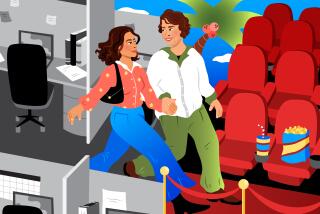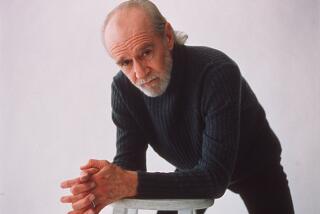He cast a big shadow
- Share via
Chris Farley’s comedy was often a bit terrifying. He could tap into his cyclonic inner life and discover characters whose exaggerated everyday weaknesses induced a sense of squirming self-recognition. Farley was the heir apparent to his fellow “Saturday Night Live” alumnus John Belushi, and the symmetry of the two men’s untimely deaths, both at age 33, has forever linked them.
Now, a new oral history, “The Chris Farley Show: A Biography in Three Acts,” has arrived to cement Farley’s place in a unique Hollywood pantheon: young artists whose untimely ends are supposed to alert us to extreme creativity’s sometimes grim trajectory. But a fresh look at Farley’s case shows yet again that they rarely do. In addition to Belushi and Farley, this dark collective includes River Phoenix and, most recently, Heath Ledger. Something in Hollywood’s collective DNA seems to insist on this cycle: Behold the damaged, substance-abusing genius, and prepare for his demise.
At Book Soup several weeks ago, the book’s co-authors -- Tom Farley Jr. (Chris’ oldest brother) and Belushi biographer Tanner Colby -- joined college friend and actor Pat Finn, “Tommy Boy” costar Julie Warner, and brother John to ponder Farley’s significance and revisit both his raging inner demons and his generous, mirthful heart. Throughout the event, however, the specter of Farley’s fatal addiction to drugs and alcohol remained. And to his credit, Tom Jr. embraced it.
“This is going to be an important book in the recovery world,” said Tom Farley, a former alcoholic who once worked at Bear Stearns but is now president of the Chris Farley Foundation, based in the Farley clan’s hometown of Madison, Wis. The organization, whose motto is “Think. Laugh. Live,” is dedicated to educating youngsters about the perils of addiction.
His and Colby’s goal in assembling the book was not to capitalize on Farley’s ongoing fame, which has entered a fourth act in the Web 2.0 generation (as Colby pointed out, there are more Chris Farley groups on Facebook than “SNL” groups). “We decided that this book wasn’t going to be ‘ha ha, he was funny and now we miss him,’ ” Tom, 46, insisted.
Instead, Chris’ older brother and apparent conscience of his Midwestern Irish-Catholic bloodline has set a difficult task for himself. Chris was the product of a family of alcoholics (all of whom eventually got sober, although Tom Sr. lived only a year after Chris’ death and, by the end, weighed almost 600 pounds). The theory behind the Book Soup event -- and a panel the next day at the iO West Theater, the Left Coast outpost of the Chicago improv troupe that gave Farley his start -- was that family and friends would pay homage to Farley’s talent and establish a tone for a discussion of his contribution to pop culture.
But it was an evening devoted to stories about Chris Farley, and so, naturally, the audience heard of gonzo antics and Brobdingnagian appetites for drink. There was that time when Farley brought a six-pack to class at Marquette University. Then there was that other time when Farley revealed the desk in his off-campus house to be loaded with all the fixings for a serious cocktail hour, included a drawer full of ice.
Throughout his life, Farely (mostly) got away with it all. “Until an addict reaches a state of grace, he’s adept at manipulation,” Tom said earlier in the day, sitting with Colby, 33, in the lobby of the Beverly Hills Hilton. “He’s moving so rapidly in all every direction to find that soft spot, you can’t keep up with him.”
Blessed and cursed
It’s nearly impossible to separate Farley’s brief life from either his innovative approach to humor or his immense capacity for self-destruction. This is far from an unusual combination, of course. Western culture has practically demanded that its poets, painters, and rule-breaking entertainers diverge from the norm -- and that often means too much liquor and too many drugs. Robert Downey Jr. has demonstrated how talent can survive this expectation; Farley, tragically, could never fully escape its pull.
“He believed that all people were basically good,” Colby said. “He was unable to separate addiction from shame.”
A high school football standout, Farley developed an early reputation for being able to effortlessly crack up everyone in the room, a knack that served him well when it became apparent that he wasn’t going to graduate to the NFL. “Chris discovered that he wasn’t a great athlete, but he was a very funny guy who was also physical,” Tom Farley noted.
These qualities became locked in a kind of desperate tango, a codependent choreography that anyone who observed Farley during his heyday could see was in all likelihood going to end badly if he didn’t get help. The Belushi affinity gave fans a template to appreciate Farley’s skills but also burdened Farley with a grim legacy. Up to a point. Because Farley never truly equaled Belushi’s superstar status, Tom Jr. and Colby have sought ways to locate the source of Farley’s more humane humor.
“Belushi is remembered as a comedy legend,” Colby said. “But very few of us know what it’s like to be the most famous person in America for two years. We all know what it’s like to be Chris and struggle for family approval. So the target audience for this book is anyone who has or came from a family.”
Still, when devotees turn out to hear what Chris was really like, the conversation almost reflexively returns to boozy topics, as if it would be a downer to recall the man as becalmed and recovered -- and, perhaps still alive. Both Tom Jr. and Colby are abundantly aware of this and have considered the possibility that those around Farley failed to do enough to save him. “It might have been different if we had looked at Chris’ problem as a family problem,” Tom said.
He recalled a three-year period when Farley was sober, the result of “SNL” executive producer Lorne Michaels’ discovery that Farley had been doing heroin and his demand that he get clean or be kicked off the show. (After Farley went to a hard-core treatment facility in Alabama, he returned to the show to create some of his most memorable characters, including the motivational speaker Matt Foley, whose fate has gone so horribly awry that he “lives in a van down by the river.”)
“We would all be drinking and there would be Chris with his coffee,” Tom remembered. “That must have been brutal for him. Then our mother got sober. And one by one, all the brothers got there. And that’s when Chris started to go again.”
Under the influence
Neither Tom Jr. nor Colby wants to blame the comedy world or Hollywood for Farley’s demise. But Colby -- who co-wrote a 2005 Belushi biography with Belushi’s widow -- indicated it didn’t help that Farley was exposed to a world in which he was allowed to check out of rehab to purchase a $70,000 car.
“If Chris had never left Wisconsin, he might have just become a heavy drinker.”
Instead, Farley went to New York, then to Hollywood and finally wound up in an apartment in Chicago with a prostitute. He had been high for four straight days, and when he finally collapsed, his last words were prophetic: “Don’t leave me.”
More to Read
Sign up for our Book Club newsletter
Get the latest news, events and more from the Los Angeles Times Book Club, and help us get L.A. reading and talking.
You may occasionally receive promotional content from the Los Angeles Times.










